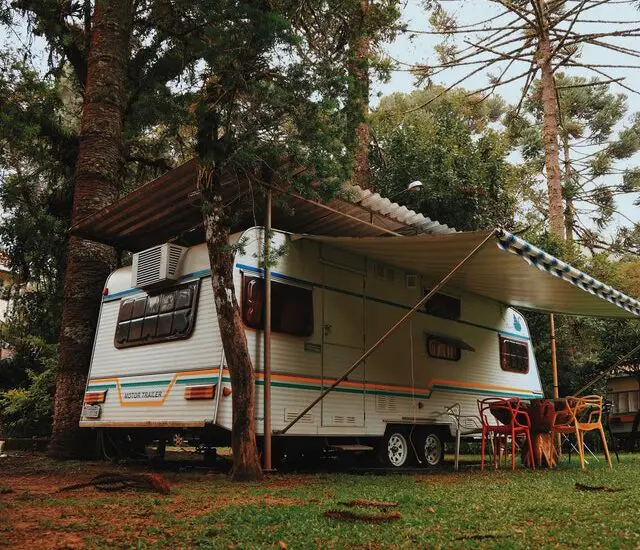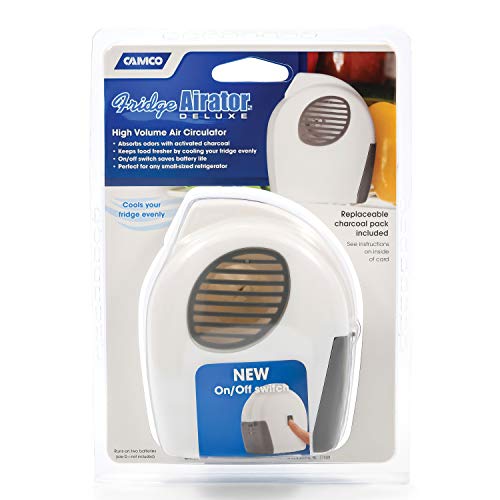
No one deserves to go through the hassles of hurling a cooler of ice into an RV and risk dealing with melted ice when RV Refrigerators that are better suited for your cooling needs have been invented.
But what’s the deal with RV refrigerators? And why can’t you use a conventional residential refrigerator?
RV refrigerators are better refrigerators than conventional residential refrigerators because they are typically made from harder metals. These materials make RV refrigerators durable, sturdy, and suited to withstand the impact of bumpy rides and rough terrains.
More so, unlike conventional compressor refrigerators, RV refrigerators don’t have moving parts that may be potential hazards while driving.
In fact, campers who insist on residential units for their RVs eventually regret their choices because these fridges don’t last long under RV conditions and may ultimately frustrate the entire purpose of recreation.
However, finding the best RV refrigerator is not as easy as one may think. This is why we put this exhaustive buying guide. This guide will help you learn about RV refrigerators and how to make the best choice.
It really doesn’t matter if you are buying one for the first time or looking to replace an old one. We are here to serve you with all you need to know about RV refrigerators.
Table of Contents
How Does an RV Refrigerator Work?
Here’s how an RV refrigerator works: a mixture of water, ammonia, and hydrogen gas heats up steadily and flows through different tubes in the refrigeration system. As the hot fluid moves through the tubes, it evaporates and condenses to cool the refrigerator.
The heat that boils the mixture in the tubes may be from an electric source, generator or shore power, or from L.P gas when there’s no power supply.
For ease and convenience, manufacturers have now included an automatic feature in the newer RV fridges. This feature makes it easy to switch the heat supply from electricity to L.P gas when the electric power supply is cut off.
With this feature, a user can rest assured that the food and drinks in the fridge will remain chilled if no one remembers to make a manual switch.
That said, there are two common RV refrigerator types: the 2-Way RV Refrigerator, which has LP Gas and AC power options, and the 3-Way RV Refrigerator which features LP Gas, AC Power, and DC Power options.
[amalinkspro type=”cta-btn-css” ctabtn-id=”” asin=”B01M3X2BDJ” apilink=”https://www.amazon.com/dp/B01M3X2BDJ?tag=refrigeratorsreviewed-20&linkCode=osi&th=1&psc=1″ addtocart=”false” new-window=”true” nofollow=”true” alignment=”aligncenter”]Check out this RV Refrigerator on Amazon[/amalinkspro]
Factors to Consider Before Buying an RV Refrigerator
There are a million and one Refrigerators for RVs in the market that are pining for your attention. But one thing is certain, if you don’t know what to look out for, you are likely going to lose money or regret your choice.
Here are some factors to consider before buying an RV Refrigerator:
1. Functionality
Before you make a choice, it is important to highlight the specific purposes you hope the refrigerator will serve. For example, you may want to consider a refrigerator with an ice maker feature if you are planning a summer campout. However, this choice may not be the best for someone who is only keen on a fridge that keeps drinks and food items cold.
However, if you have space constraints that won’t allow you to have a refrigerator between cabinets, then you may want to consider going for a portable stand-alone refrigerator. It will be a perfect buy if you are always on the move.
These refrigerators are usually roomy, budget-friendly, and perfect for space management. They can also be used indoors or outdoors at campsites.
2. Size
You may never really know what refrigerator size to go for if you don’t have accurate or near-accurate dimensions of the space you are willing to give up for the refrigerator. This is why you need to measure the space you have before you make a selection.
However, if you don’t know how to get the precise measurements, then it will help to go with a conversion chart. But that’s if you are replacing an old refrigerator. If you want to replace a Norcold refrigerator, for instance, you can take advantage of the Norcold Conversion Chart. As a rule, it is better for a refrigerator to be smaller than the available space. A bigger one won’t be able to fit into your space.
[amalinkspro type=”cta-btn-css” ctabtn-id=”” asin=”B01M3X2BDJ” apilink=”https://www.amazon.com/dp/B01M3X2BDJ?tag=refrigeratorsreviewed-20&linkCode=osi&th=1&psc=1″ addtocart=”false” new-window=”true” nofollow=”true” alignment=”aligncenter”]Check out this 3-Way RV Refrigerator on Amazon[/amalinkspro]
3. Capacity
RV refrigerators come in various sizes and capacities as well.
Ideally, the choice of a refrigerator based on capacity is, for the most part, a choice that is exclusive to you because you know best how much space you need.
Capacity may also be related to the size; which will be determined by how much space you have. So, it helps to ensure that the amount of space that you have is just fine before you make a choice based on capacity.
4. Price
RV Refrigerators can be pricey. There are RV refrigerators under $1,000 and some others that cost up to $3,500 or more. Typically, the price of an RV refrigerator will be on the higher end of the range if it has bells and whistles.
Remember that we said that unlike residential units that are made from soft metals and some plastic, RV fridges are made with materials like high-grade steel for durability and protection against vibrations and impact. These materials are relatively costlier and will affect the cost of production which will, in turn, affect the price of the unit in the market.
However, if you are working with a tight budget, then you may want to try out refurbished refrigerators. But be sure that the one you go for is not a flimsy chilling box.
Nonetheless, it is advisable to go for newer models because they are usually backed with a manufacturer’s warranty What’s more They may come with free installation.
Important Note: Installing an RV Refrigerator is no mean feat; especially if you are not technically inclined or a handy person. Often times, you will need the help of an expert to install an RV refrigerator.
You may also take advantage of tutorial videos like the one below to see how you can install one.
Check out these other articles and reviews…
- Where Should Vaccines That Require Refrigeration Be Stored?
- Danby 120-Can Beverage Center — Extensive Review
- How Long Can You Keep Hard-Boiled Eggs in the Refrigerator?
- Black+Decker 2.3-Gallon 12V Cooler/ Warmer — Extensive Review
- How to Move a Refrigerator in a Pickup Truck [Detailed Guide]
- 12V Refrigerators: A Buyer’s Guide
RV Refrigerators — Related FAQs
What is the Best RV Refrigerator?
The best RV refrigerator for you is a refrigerator that offers ample capacity while taking up only a small portion of your real estate. It should be able to cool your food items efficiently and at safe temperatures without consuming so much energy. A good RV refrigerator should also be durable enough to serve you for a long time.
Here are some of the refrigerators that fit into our top pick for the best RV refrigerator:
- Smad 40-Liter Compact Mini Refrigerator.
- SMETA 2-Way Compact RV Refrigerator.
- Aspenora 54-Quart Refrigerator/Freezer.
- Smad Propane 3-Way RV Refrigerator.
- ICECO VL45 45-Liter Portable Refrigerator.
- Whynter 62-Quart Dual-Zone Portable Fridge.
- Norcold 3-Way RV Refrigerator.
- ARB 63-Quart Weatherproof Portable Refrigerator/Freezer.
- Dometic CFX 100W 85-Liter Portable Refrigerator/Freezer.
[amalinkspro_table id=”3957″ aff-id=”undefined” new-window=”on” nofollow=”on” addtocart=”off” /]
Can I Replace My RV Refrigerator with a Standard Refrigerator?
You can replace your RV refrigerator with a standard residential refrigerator. However, you will need to put in some work to do that. You will also need to consider a few important factors before you replace your RV refrigerator.
Some of the factors to consider before you swap your RV refrigerator for a standard model include an AC power outlet, remote power from a generator, the airflow around the fridge, and the lifespan of the refrigerator.
How Do You Run an RV Refrigerator While Driving?
Running your RV refrigerator on propane while driving is very dangerous. So, if you need to run an RV refrigerator while driving, shut off your propane supply completely, and switch to the 12V power option.
Alternatively, you can run your RV fridge on AC power by using an RV generator. One benefit of running your RV on a generator while driving is that you also get to power other electrical appliances like your air conditioning unit at the same time.
[amalinkspro type=”cta-btn-css” ctabtn-id=”” asin=”B01M3R711N” apilink=”https://www.amazon.com/dp/B01M3R711N?tag=refrigeratorsreviewed-20&linkCode=osi&th=1&psc=1″ addtocart=”false” new-window=”true” nofollow=”true” alignment=”aligncenter”]Click here to check out this RV-ready generator on Amazon[/amalinkspro]
What is the Correct Temperature to Run an RV Refrigerator?
To maintain food safety in your RV refrigerator, ensure that you keep the temperature at the bottom section of the fridge between 34 to 43 degrees Fahrenheit.
A simple way to maintain a suitable temperature in your RV refrigerator is to hang a refrigerator thermometer on one of the shelves in the fridge to monitor the temperature periodically.
However, note that items like eggs, fruits, and vegetables may begin to freeze once the fridge starts running at 37 degrees Fahrenheit. To avoid this, a safe temperature to run your RV refrigerator will be between 38 and 43 degrees Fahrenheit.
Check out these other articles…
- Kenmore Refrigerator Dispenser Problems [Solved]
- Samsung Fridge Freezing Food [How to Fix]
- LG Fridge Freezing Food [solved]
- Kitchenaid Fridge Freezing Food [Quick Fix]
- GE Fridge Freezing Food [How to Fix]
- Kenmore Fridge Freezing Food [Solved]
- Miele Freezer Not Freezing [How to Fix]
How Long Does RV Refrigerator Take to Get Cold?
An RV refrigerator may take about 4 to 6 hours to cool down after the initial startup. If you plan to go on a trip, it is good practice to leave the fridge on for up to 24 hours before placing any food item in it.
To increase the efficiency of your RV refrigerator, place cold foods in the fridge and frozen items in the freezer. Avoid overpacking the fridge with items to allow easy air circulation in the refrigerator.
You can also improve the air circulation in your RV refrigerator and reduce how long it takes the fridge to cool down by placing a battery-operated refrigerator fan in the fridge. Ensure that the refrigerator fan blows upwards to get the best result from this RV refrigerator tip.
[amalinkspro type=”cta-btn-css” ctabtn-id=”” asin=”B01E5SNB5I” apilink=”https://www.amazon.com/dp/B01E5SNB5I?tag=refrigeratorsreviewed-20&linkCode=osi&th=1&psc=1″ addtocart=”false” new-window=”true” nofollow=”true” alignment=”aligncenter”]Click here to check out this battery-powered refrigerator fan on Amazon[/amalinkspro]
Can RV Refrigerators be Recharged?
You can possibly recharge your RV refrigerator when the coolant level is low as long as you have the necessary certification from EPA to do it. However, it is advisable not to attempt to recharge your RV fridge without expertise. This is because of the highly flammable mixture of hydrogen, ammonia, and water in the unit.
Meanwhile, bear in mind that not all RV refrigerators can be recharged. For instance, because they don’t have coolants, thermoelectric RV fridges cannot be recharged.
Moreover, not all RV refrigerator issues are related to low coolant levels. When in doubt about what the issue is with your RV fridge, call a technician to check it out.




Pingback: How Much Propane Does an RV Refrigerator Use - In-depth Refrigerators Reviews